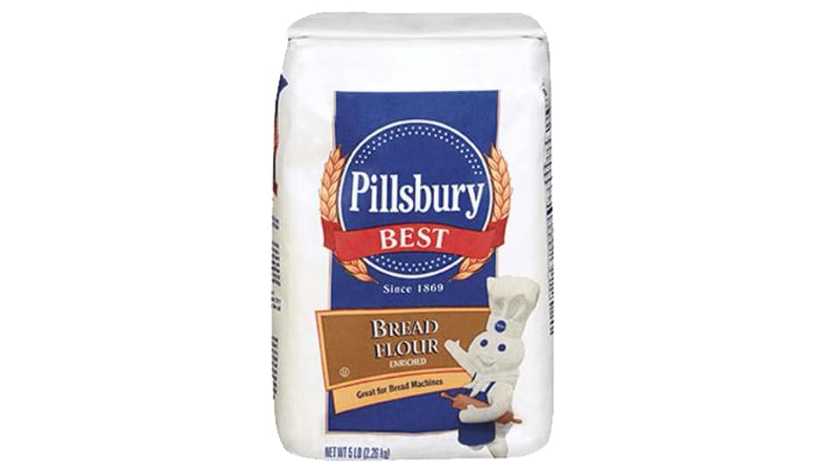- Sections :
- Crime & Public Safety
- Restaurants & Food
- Sports
- More
Food Safety Alert - 7 brands of flour recalled due to contamination

WASHINGTON, D.C. -- Several brands and types of flour have been recalled because they may be contaminated with E. coli. Consumers should not use recalled products. The following products have been recalled:
Pillsbury Best Bread Flour
On June 14, 2019, Hometown Food Company, a customer of ADM Milling Co., announced a recall of 5-lb. bags of Pillsbury Best Bread Flour with UPC Code 0 5150020031 5 and the following lot codes and use-by dates:
Lot Code: 8 342, Use-By Date: JUN 08 2020
Lot Code: 8 343, Use-By Date: JUN 09 2020
King Arthur Flour
On June 13, 2019, King Arthur Flour, Inc., a customer of ADM Milling Co., announced a recall, 218 cases of 5-lb. bags of King Arthur Unbleached All-Purpose Flour. You can identify recalled flour by looking for the following best-used-by dates and lot codes on the bag’s side panel, below the nutrition facts box:
Best Used By 12/07/19, Lot: L18A07C
Best Used By 12/08/19, Lots: L18A08A, L18A08B
Best Used By 12/14/19, Lots: L18A14A, L18A14B, L18A14C
ALDI Baker’s Corner All Purpose flour
On May 23, 2019, ALDI, in association with ADM Milling Co., recalled all 5-lb. bags of Baker’s Corner All Purpose Flour.
Recalled flour was sold at retail locations in the following states: Connecticut, Delaware, Massachusetts, New Hampshire, New Jersey, New York, Ohio, Pennsylvania, Rhode Island, Vermont, and West Virginia.
Consumers should not use any of the recalled flour. Throw it out.
If you stored flour in another container without the packaging and don’t remember the brand or “use by” date, throw it away.
Thoroughly wash the container before using it again.
Eating raw dough can make you sick.
Any flour or raw eggs used to make dough or batter might be contaminated with harmful germs.
Bake or cook food made with raw dough or batter before eating it. Follow the recipe or instructions on the package. Do not use recalled flour in cooking or baking.
Do not taste raw dough or batter. Even tasting a small amount could make you sick.
Clean up thoroughly after baking.
Wash any bowls, utensils, and other surfaces that were used when baking with warm water and soap.
Wash your hands with water and soap before and after baking.
Contact your healthcare provider if you think you may have become ill from eating raw dough.
Restaurants and other retailers should not use, sell or serve any of the recalled flour.
If you stored flour in another container without the packaging and don’t remember the brand or “use by” date, throw it away.
Restaurants and retailers should thoroughly wash flour storage containers before using them again.
Restaurants and other retailers should always be safe with raw dough.
Do not give customers raw dough to play with or eat. It is not safe to eat or play with raw dough, whether made from recalled flour or any other flour.
Bake or cook food made with raw dough or batter before serving or selling it. Follow the recipe or instructions on the package. Do not use recalled flour in cooking or baking.
Latest Outbreak Information
Illustration of a megaphone.
Seventeen people infected with the outbreak strain of E. coli O26have been reported from eight states.
Illnesses started on dates ranging from December 11, 2018, to April 18, 2019.
Three hospitalizations and no deaths have been reported.
Epidemiologic and laboratory evidence indicates flour is a likely source of this outbreak.
Several products have been recalled because they may be contaminated with E. coli. Those products include all 5-lb. bags of Baker’s Corner All Purpose Flour sold at ALDI, some 5-lb. bags of King Arthur Unbleached All-Purpose Flour, and certain 5-lb. bags of Pillsbury Best Bread Flour. For more information about these recalls, visit the FDA.
This investigation is ongoing. FDA is working to determine whether other brands or lots of flour may be contaminated and need to be recalled. CDC will provide updates when more information is available.
Symptoms of E. coli Infection
Illustration of a person with stomach pain.
People usually get sick from Shiga toxin-producing E. coli (STEC) 2–8 days (average of 3–4 days) after swallowing the germ.
Some people with a STEC infection may get a type of kidney failure called hemolytic uremic syndrome (HUS).
E. coli infection is usually diagnosed by testing a stool sample.
For more information, see Symptoms of E. coli Infection.
Advice to Clinicians
Antibiotics are not recommended for patients with suspected E. coli infections until diagnostic testing can be performed and E. coli infection is ruled out. Some studies have shown that administering antibiotics to patients with E. coliinfections might increase their risk of developing HUS, and a benefit of treatment has not been clearly demonstrated.
















